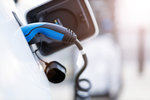

The Lacey Finance and Economic Development Committee reviewed the rate policies for charging electric vehicles (EV) in the city during its meeting on Tuesday, June 27.
Lacey Public Works Management Analyst Marcus Hoch said the city is currently upgrading and expanding its EV charging infrastructure which may increase demand for usage, thus increasing energy costs for the city.
At present, the existing charging stations are free to use, with Lacey paying all operating costs for the system. Hoch presented three pricing options the city can consider once the new charging stations are installed.
Maintain the free service for users. Lacey would not receive revenue from the charging stations. Hoch said this option could cost Lacey approximately $41,000 yearly in expenses or more.
Recover the entry cost of the fees associated with ChargePoint, which would increase the kilowatt per hour from 12 cents to 14 cents. That's usually to cover the credit card processing fees of the customers, said Hoch. He added that it would generate about $43,000 in revenue yearly, but the city's expenses would be about the same with the first option.
Cover the energy recovery, ChargePoint expense, and collect replacement cost of the stations. To recover costs, the Level-2 Station rate would be $0.19 per kWh, and the DC Fast rate would be $0.29 per kWh. At these rates, a reserve would be created to fund the cost of replacing the stations in approximately ten years.
According to the staff report, another feature that should be included in the Pricing Strategy is the "Idle/Overstay Fee," which charges customers when an EV has stopped charging. "The purpose of this fee is to motivate EV owners to move their vehicles and create an opportunity for others to charge their EVs," the report read.
Hoch said staff recommends the third option with an Idle/Overstay fee. "Currently, we do not charge anything, and basically people just park there all day," said Hoch.
Lacey Mayor Andy Ryder said he is concerned about charging the replacement cost to the consumers, considering that the city got the stations through a grant.
"We're not the private sector, we're the public sector," said Ryder. "We're doing this to try to provide this service so we have more people using this or have the ability to use this."
Deputy Mayor Malcolm Miller echoed Ryder's concern, adding that the city needs to ensure it's not keeping the public's money. "We want to make sure that we don't take public money and just sit on it," he added.
On the other hand, Council member Lenny Greenstein said it is better to build the money for the general fund than rely on future grants.
"We can't budget based on the possibility of future grants that we have no idea whether they'll exist in 10 years," said Greenstein.
The committee then decided to forward the proposal to the whole city council for further review and discussion.
1 comment on this item Please log in to comment by clicking here
jimlazar
Lacey is in the right ballpark with this discussion.
The cost of electricity to charge an EV is about $0.12/kWh, which works about to the equivalent of about $1.50/gallon of gasoline. It's cheap compared to gasoline. My plug-in hybrid can run on either electricity or gasoline. It gets about 4 miles per kilowatt-hour, and about 48 miles per gallon. So a gallon is about equal to twelve kilowatt-hours in terms of how far you can drive. The bigger EVs, like the Ford Lightning pickup, get fewer miles per kilowatt-hour, but the gasoline equivalents get fewer miles per gallon, so the ratio still holds.
The fee for charging an EV needs to be lower than the equivalent cost of gasoline. The highest price considered -- about $.19/kwh for a slower Level 2 charger is about $2.50/gallon. Still in the ballpark.
The higher rate of $0.29/kWh for high speed charging, however, is closer to $4.50/gallon equivalent. That's an upper limit -- about the same as the current cost of gasoline.
The price of electricity does not include the road tax that is built into the price of gasoline. BUT, the price of gasoline does not include the 4% state tax, and 6% city tax that is built into the price of electricity. EV owners pay an annual registration fee in place of road tax on fuel. But gasoline vehicles do not pay a sales tax or other general government tax on fuel, so EV drivers are, in effect, double-taxed. Lacey should at least discount the price of EV charging by the 6% City tax they will receive on the electricity used. There is no need for Lacey to make a profit on this.
Zero cost charging has been a great deal, and has helped attract some drivers to consider EVs. Now that they are reaching 10% of all new cars sold, it's reasonable to at least recover the cost of the electricity (minus the tax). In a few years, as the charging equipment paid for with grants wears out, it will be appropriate to also recover the cost of the charging equipment.
Option 2 is the right choice for now. Option 3 will be appropriate in a few years.
Wednesday, June 28, 2023 Report this